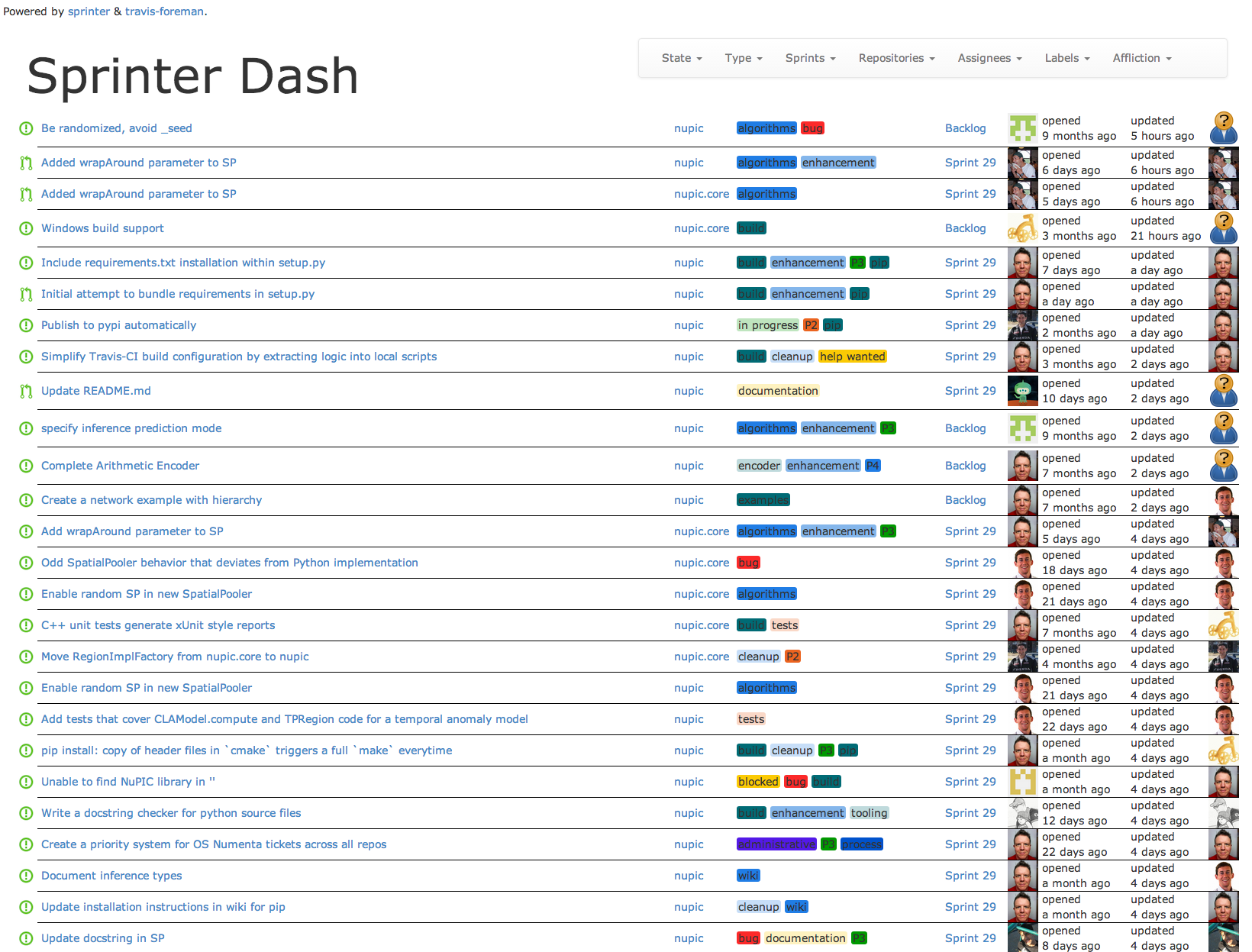Sprinter Dash

|
This is a web dashboard for sprinter with client-side filters. |
Sprinter Dash is a web frontend for viewing issues from multiple GitHub issue trackers on one view. It provides views for:
- recent issues (past 2 days)
- current issues [default] (past 2 months, open and closed)
- old issues (created over 6 months ago)
- stale issues (updated over 2 months ago)
Once issues are loaded on the client, they can be filtered locally by:
- repository
- assignee
- type (PR or issue)
- state (closed / open)
- label
- milestone ("Sprints")

Authentication with GitHub
You must provide GitHub credentials to run SprinterDash. They can be provided as environment variables: GH_USERNAME, GH_PASSWORD. In this case, they are picked up automatically and used. Or you can specify them in the SprinterDash constructor if attaching to an existing Express application (see below).
Quick Start
For this example to work, simply clone this repo and set the following environment variables: GH_USERNAME, GH_PASSWORD. Then run:
npm install .
node index.js
This will start a server monitoring a couple of default repositories.
Use your own repos
You can specify what repositories to gather issues from with a comma-delimited list of repository slugs. Specified repositories must have GitHub Issues enabled.
node index.js org1/repo1,org1/repo2,org2/repo3
Incorporate into your own Express server
You can create an instance of SprinterDash and attach it to an existing Express application. This is how it is used at http://status.numenta.org/issues.
var SprinterDash = require('sprinter-dash');
var dash = new SprinterDash({
repos: ['org1/repo1', 'org1/repo2']
, ghUsername: <GITHUB USERNAME>
, ghPassword: <GITHUB PASSWORD OR AUTH TOKEN>
});
var app = express();
dash.attach(app, 'dashboard');
app.listen(8080);
SprinterDash will be running on http://localhost:8080/dashboard. The following views are available, where <url-prefix> is dashboard in the above example:
/<url-prefix>/issueswill display all issues within the past 2 months with a filter bar./<url-prefix>/issues/:loginwill display issues assigned to the user specified by:login, as well as issues mentioning the same user./<url-prefix>/prioritywill display issues in priority order if you haveP1,P2,P3, &P4labels.
Available Data Routes
When using the attach() function, SprinterDash will set up the following data routes that you can call from your application's front-end:
/<url-prefix>/_issues: returns all issues updated within 2 months/<url-prefix>/_recentIssues: returns all issues updated within 2 days/<url-prefix>/_oldIssues: returns all issues over 6 months old/<url-prefix>/_staleIssues: returns all issues updated over 2 months ago
These URLs will return JSON issue data.
Available Template Routes
/<url-prefix>/client/templates/issues.html is the location of the Handlebars template used to render issues client-side. You can re-use this to provide the SprinterDash view in any page of your website (as shown in http://status.numenta.org/).
The <url-prefix> defaults to dash, but can be specified by passing a the urlPrefix parameter to attach() as shown in the example above.
Show Travis-CI build status
If you pass a travisOrg into SprinterDash, Travis-CI builds will be shown when running in the issue table.
var dash = new SprinterDash({
repos: ['org1/repo1', 'org1/repo2']
, travisOrg: 'rhyolight' // GitHub org or username
, ghUsername: <GITHUB USERNAME>
, ghPassword: <GITHUB PASSWORD OR AUTH TOKEN>
});

